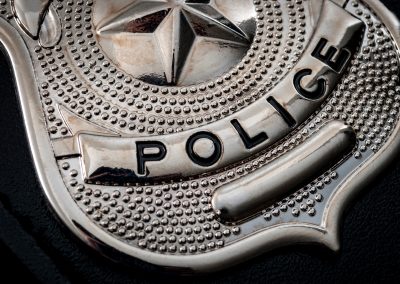I believe there are generally two types of police officers. These are:
- The Slugs: These generally do as little as possible, just enough to keep the bosses off of their collective behinds. They work harder at not working than doing the actual job.
- The Journeymen: They work because they want to make a difference becoming cops for all the right reasons. These officers are the foundation of a police department.
If I were to ask you, “Of these two groups, which find themselves in trouble most?” What would be your answer?
For those of you not in law enforcement, who work in the private sector and have goals, agendas, and deliverables related to the bottom line, you’d most likely say that the obvious answer is #1—The Slugs.
And you wouldn’t be more wrong.
Held to Different Standards
Those Slugs, get in trouble the least—by far!
“What? No! That just doesn’t make sense.”
You’re right, it doesn’t make any sense. At least not if you live in the world that sees a correlation between specific behavior, completion of tasks, innovative thinking and financial success.
In the private sector the ultimate goal is the bottom line. Achieve or go out of business.
But government and law enforcement is a completely different animal. What is the goal of those working in government? Keep your job.
I know that sounds cynical, but it has become the nature of the bureaucratic beast. Check with any police agency in the country and see if you can find published, predetermined, specific and measurable goals to which employees will be held to account. Don’t waste your time, they don’t exist.
What you will find are well-intentioned and sincere “Mission Statements” designed to communicate philosophy. What they won’t specify are measurable goals, such as a reduction of crime rates, a decrease in the numbers of homicides and/or the saving of lives.
Why? Because in government there is no real bottom line, no way to actually go out of business. Almost no way to get fired, unless of course you screw something up. And, to screw something up you need to be doing.
Slugs vs. Journeymen
Back to The Slugs and The Journeymen.
The people in Baltimore are screaming that the police aren’t doing their jobs. I saw one citizen on the tube saying something along these lines: “They get paid. They need to get back here and do their jobs. I don’t care what their excuses are. We pay their salaries, just order them to get back here and do what they get paid to do!”
And there is the conundrum. What do they get paid to do, exactly?
Define it specifically. Oh, you can demand they answer 9-1-1 calls, write legible and thorough reports, and patrol specific areas.
But beyond that? You can’t. Seriously, you can’t define the specifics when it comes to the day-to-day activity and behavior of an individual police officer.
Hell, most states won’t even allow the imposition of minimum standards (quotas). And even if quotas are allowed, how do you manage and supervise that? You want them to write one ticket a day? Great! The Slugs will write one ticket. But never two.
The simple fact is this: Police officers who do the bare minimum NEVER get fired. You won’t find cops getting pink slips for a process of lousy work over a period of years. No, when police officers get fired they get fired because of an event: They get fired for doing!
The reality: Police officers have a job that isn’t task specific and is almost totally autonomous. If they want to drive around all day answering radio calls and do nothing more, they can. They won’t be fired for not being proactive because proactivity cannot be managed.
The People Want—What?
The people in Baltimore, New York and Chicago are experiencing a rise in crime and they are all looking to the police for help. Suddenly the complaint is that the police aren’t proactive enough.
Not proactive enough? Really?
For the last year everyone from the Mayor of New York to the national media and the ACLU has been screaming that the police are too proactive, too aggressive, too involved. Too many arrests were made for minor crimes: single sales of cigarettes, loitering, jaywalking, personal use of marijuana, etc.
Stop-and-frisk arrests became associated with racism and an example of rampant bias and prejudice. When force was used, the media portrayed it as the fault of the police and not those who were brazenly committing crimes and resisting arrest.
The media, politicians, pundits and intellectual class demanded that officers be held accountable.
So who got in trouble? The Slugs? Nope! It was the proactive cops, The Journeymen. And they’ve gotten the message: If I do less I get paid the same, can’t get hurt, and won’t get in trouble.
What most don’t understand is that the stop-and-frisk cops are the best police officers on the street. They use their experience and honed instincts to stop crime before it happens. They are invaluable to the citizens who truly need them patrolling their streets.
Great cops detect the body language cues of drug dealers, armed robbers, pick-pockets and others who make their living victimizing the innocent. And when they do, they approach, question and if they have articulable facts and reasonable suspicion, they frisk.
And not only is it the absolute best way to thwart and deter criminal behavior, it’s 100 % legal.
And for the last year or so, great cops have been called racists, brutes, thugs and criminals.
Now What?
How do you manage police officers who have decided to do only the bare minimum? How do you demand proactive behavior? How do you manage and discipline for a lack of it?
Guess what? You can’t.
You want them using their experience. You need to encourage proactivity. But that means risk. It means having to justify actions after they’ve been taken. Why did you stop that particular person? What exactly drew your attention? And since reasonable suspicion is less than probable cause and tough to articulate, this leaves tons of room for the injection of bias complaints from everybody.
Motivation, true motivation, is intrinsic in nature, especially for law enforcement officers. That motivation is being beaten out of the proactive cops. They are getting the message.










0 Comments